A Brief Colonial History Of Ceylon(SriLanka)
Sri Lanka: One Island Two Nations
A Brief Colonial History Of Ceylon(SriLanka)
Sri Lanka: One Island Two Nations
(Full Story)
Search This Blog
Back to 500BC.
==========================
Thiranjala Weerasinghe sj.- One Island Two Nations
?????????????????????????????????????????????????Saturday, April 30, 2022
Murdered journalist Sivaram remembered across the North-East
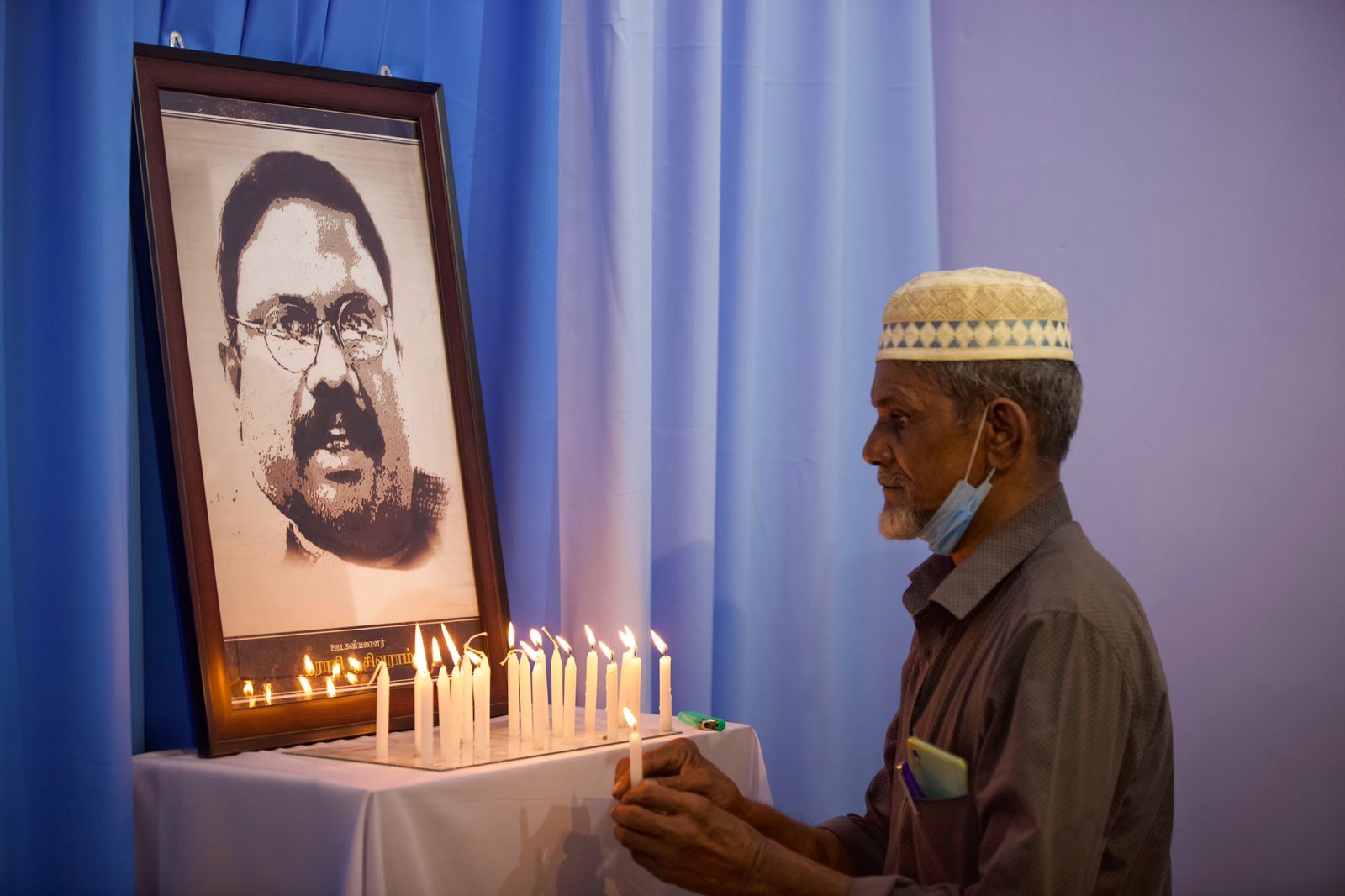
Memorial events were held across the North-East to mark the 17th anniversary of murdered Tamil journalist, Dharmeratnam Sivaram.
29 April 2022
Sivaram, popularly known under his nom-de-plume Taraki, was abducted in front of Bambalipitiya police station in Colombo on April 28 2005, and was found dead several hours later in a high security zone in Colombo, which at the time had a heavy police and military presence due to the ongoing conflict. His killers, highly suspected to be linked to the government of then-president Chandrika Kumaratunga, were never caught.
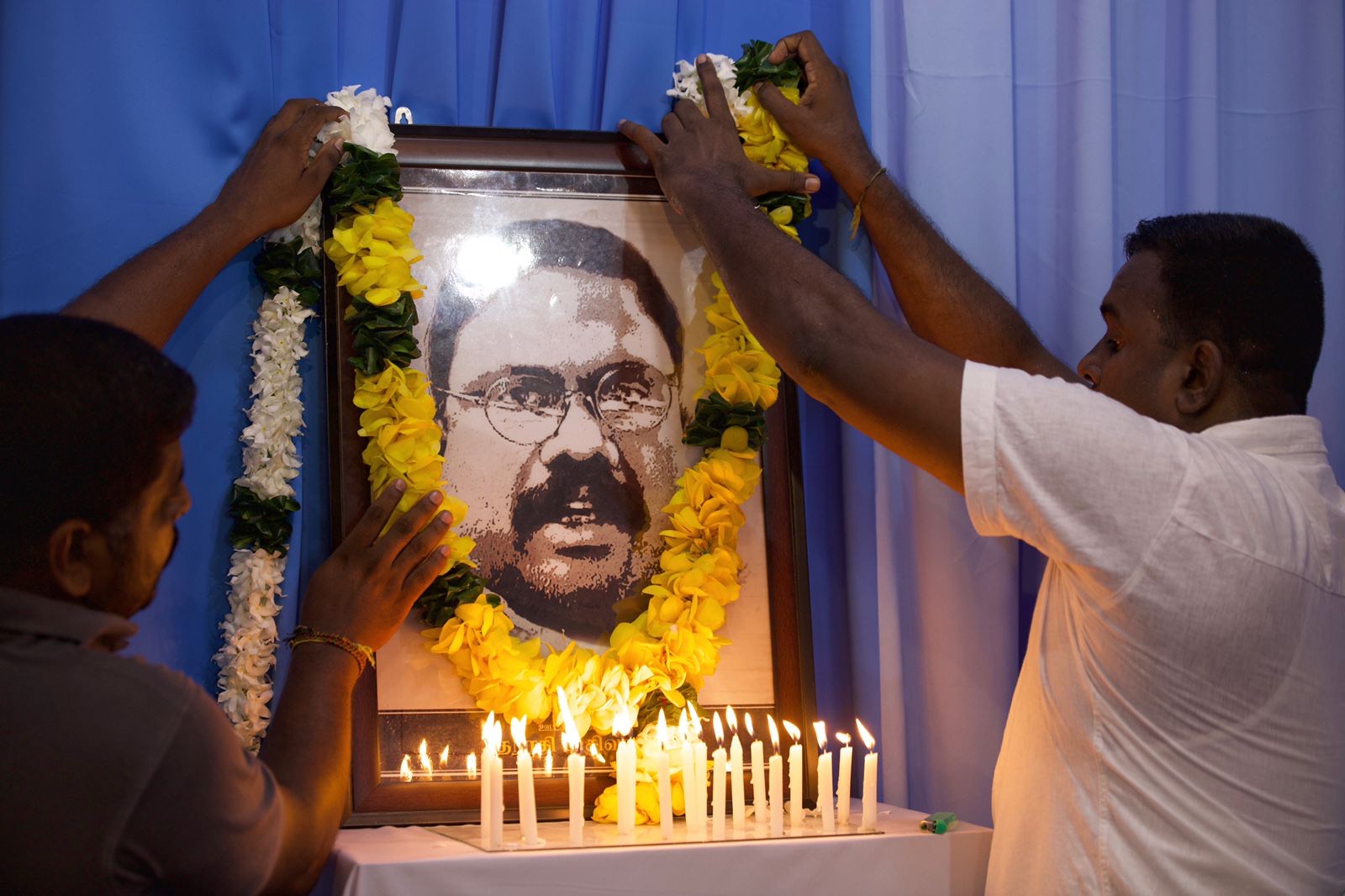
A protest was held in Batticaloa this morning, to commemorate and demand justice for Sivaram and other Tamil journalists that have been murdered on the island.
TNA politicians R Shanakiyan and M A Sumanthiran also joined members of the clergy and other journalists in paying tribute to Sivaram at memorial in the city.
The Jaffna Press Club held a remembrance event for Sivaram and another murdered Tamil journalist, Selvarajah Rajivarman.
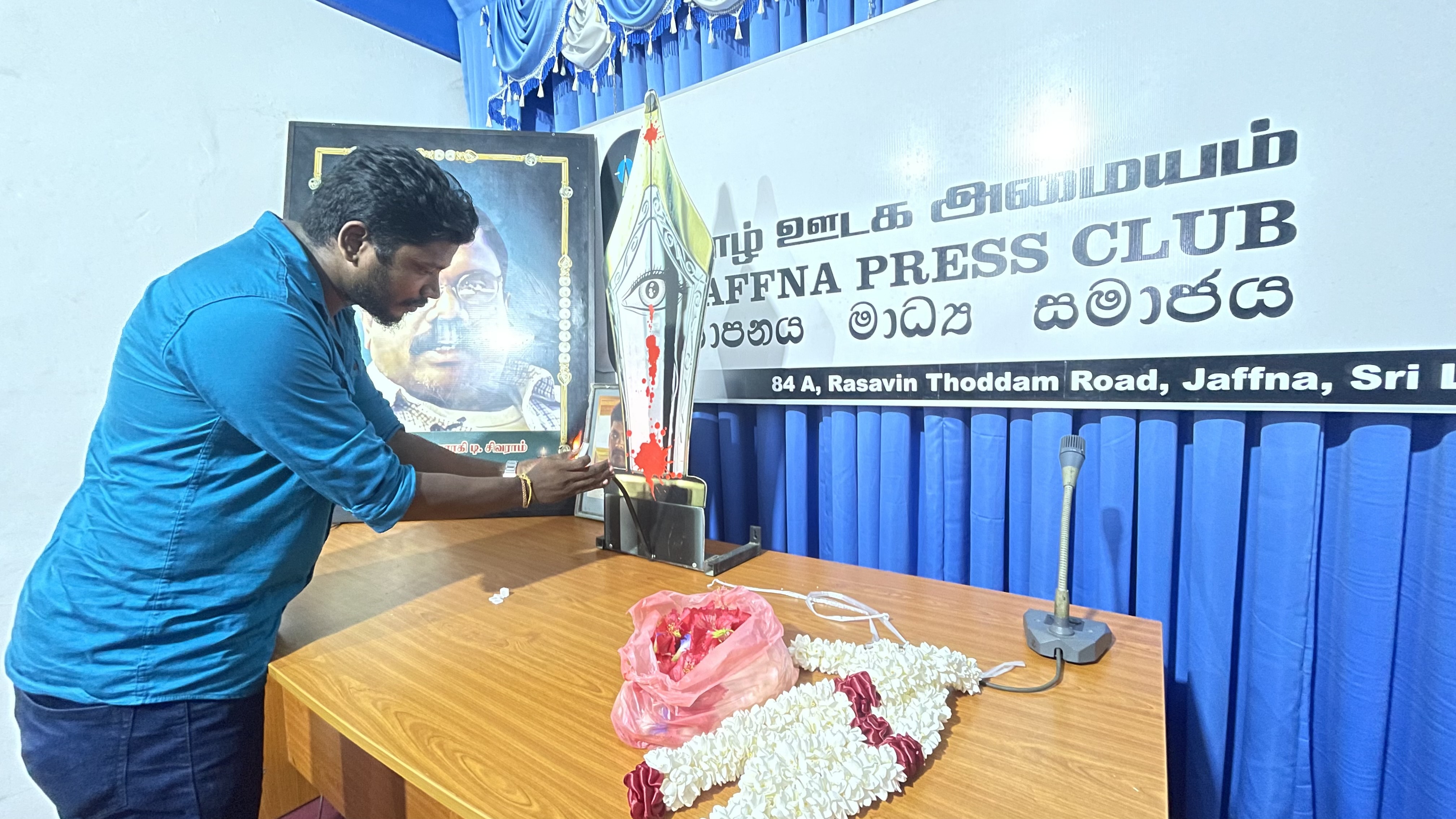
Rajivarman, who worked for Namathu Eezhanadu and Thinakkural before joining the Uthayan, was killed on April 29, 2007, by a lone gunman in the middle of Jaffna town. He was just 25 years old at the time. Rajivarman used to go to the police stations and hospitals to seek information about the many crimes that were taking place in Jaffna at the time.
The Mullaitivu Press Club also held a memorial event at their office which was attended by civil society representatives and families of the disappeared.
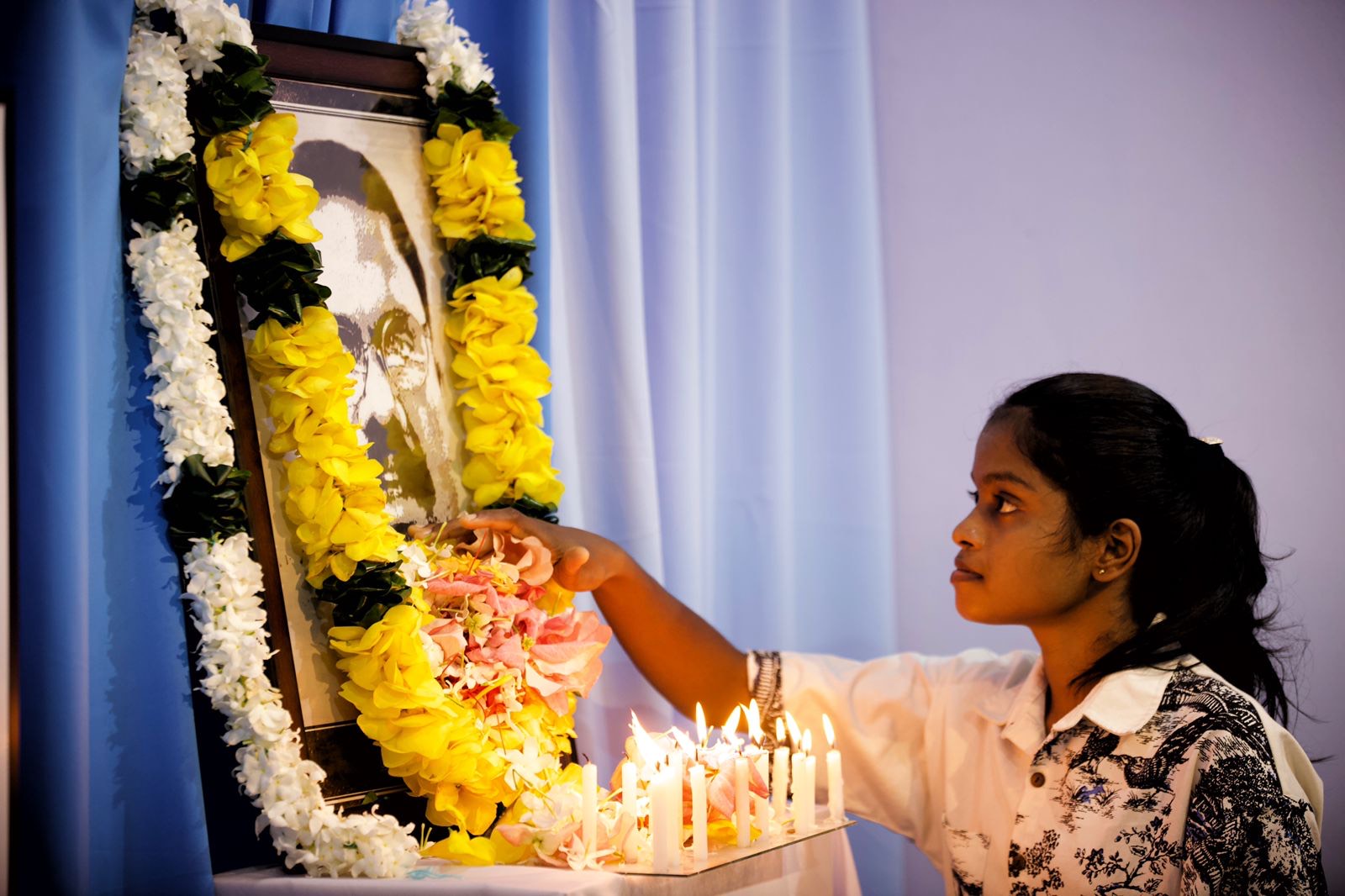
Families of the disappeared in Vavuniya remembered Sivaram by lighting candles on their 1896th day of continuous protest.
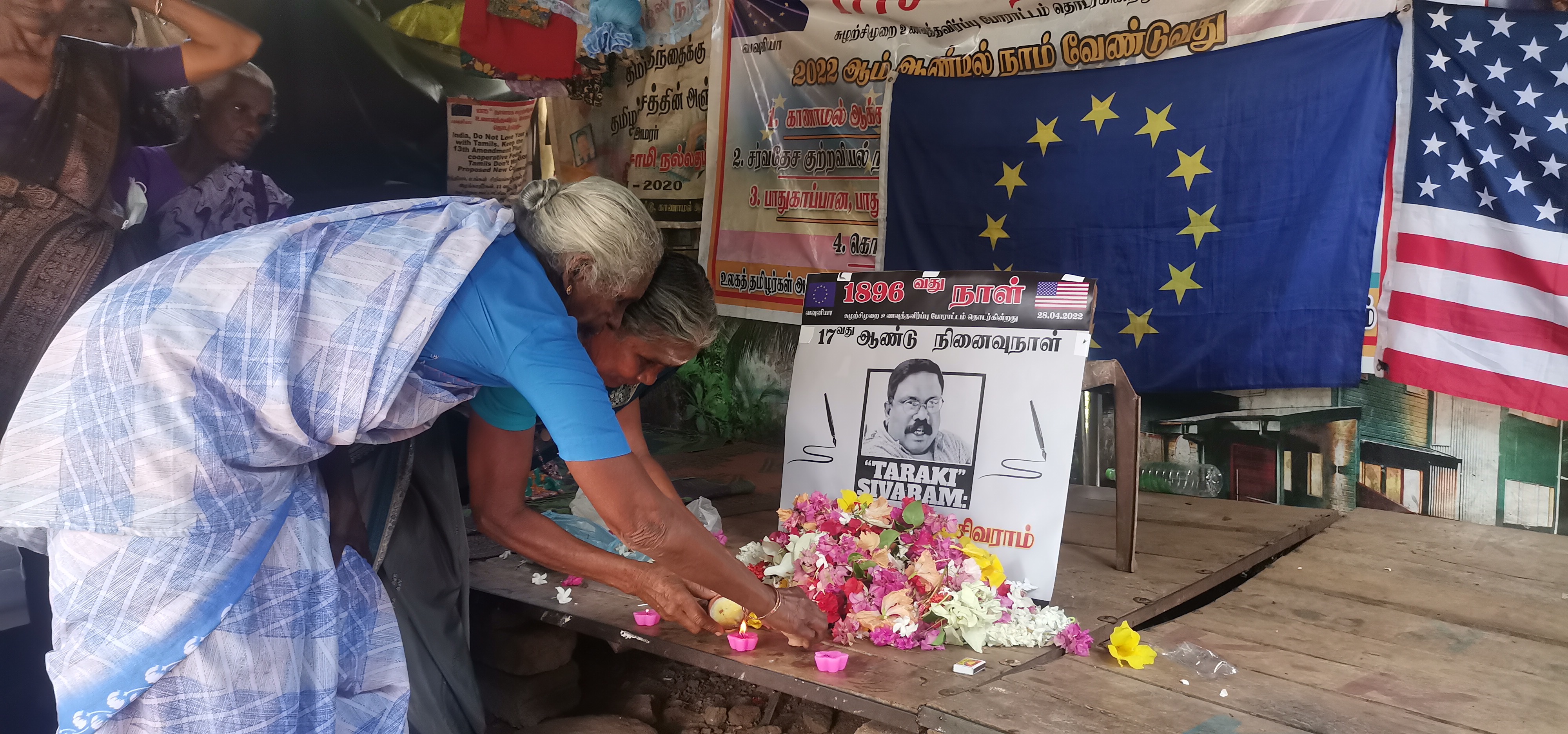
Vavuniya Tamil Journalists Association also paid tribute to the slain journalist by laying flowers and lighting candles.
Related Articles:
Governance in Sri Lanka: We must not miss this opportunity
The unions, the professionals, the private sector and civil society must take and hold the initiative for systemic and regime change with the predominantly young protestors in Galle Face who have so imaginatively and boldly initiated it - Pic by Ruwan Walpola
Saturday, 30 April 2022
The situation in the country is one of dynamism as well as stalemate.
Dynamism on account of the determination, creativity and resilience of the Gotagogama demonstrators, the extension of their efforts to the Mainagogama demonstration outside Temple Trees to the sheer celebration of Sri Lanka’s diversity and the unity of its peoples, to the presentation of the 21st Amendment in Parliament by the SJB Opposition and their mammoth march from Kandy, culminating in Colombo on May Day as well as the Hartal; stalemate because the Rajapaksas show no sense of shame and indeed self-respect to heed the call of the people and GO.
The concession of some elements of the 19th Amendment being reintroduced is being suggested by them. However, both Gotabaya and Mahinda Rajapaksa intend to stay in Government, tinker with the Constitution, shuffle the pack of ministers, in the belief that in the longer or long haul the protests will evaporate and eventually be abandoned.
They are being disabused of this attitude and belief on a daily basis, but admittedly insufficiently so far, to heed the message of the country. Consequently, pressure must intensify to demonstrate to them that they cannot govern the country – yes, the country must be made ungovernable under their remit, by peaceful and non-violent action. Peaceful non-cooperation should be considered, with the consent, cooperation and active participation of the private sector as well to succeed.
It will get worse before it gets better on the economic front, is the message of many, including the finance minister. This is a phase of our history which we have to acknowledge we allowed ourselves to get into and therefore must acknowledge too, the considerable pain and suffering entailed to get out of it. Not everyone will accept this, but if and when the IMF deal kicks in, the government of the day will have to launch an island-wide communications campaign to explain to the people what we invited upon ourselves and why we have to further suffer the pain the IMF deal will bring with it as a necessary part of getting ourselves out of the crisis and back on a trajectory of growth.
It is absolutely vital that a government attempting this enjoys the trust and confidence of the people. It just cannot work otherwise and risks social and political upheaval and repression. Let us brace ourselves to the fact that getting rid of the Rajapaksas is only one part of our salvation from the current crisis or indeed a necessary but not sufficient condition for it. It is just the pivotal beginning, if the opportunity provided by the deep crisis is to be availed upon to deal with the real, fundamental issues of our governance and economy.
Whilst the protests continue, focus shifts to Parliament in terms of the proposed 21st Amendment. The issue here as well is of numbers. Does the SJB have a simple majority to pass the motion of No-Confidence and will it prove to be the base upon which they can build a two-third majority to abolish the executive presidency? The Government has responded with its own version of the 21st Amendment but the public is yet to be apprised of what it contains. The President is reported to have said that he will appoint an interim government if the parties in Parliament can decide upon its composition. There are reports too of a split in the ranks of the SLPP between the president and the prime minister – with the former supposedly willing to make a sacrifice of the latter to stay in office and save the dynasty in politics.
The SJB and the JVP are absolutely right in their position of not having anything to do with any government under Gotabaya Rajapaksa or any that includes his siblings. Whilst those arguing for a compromise in the face of the Rajapaksa unwillingness to leave government may consider a much weakened Gotabaya Rajapaksa presidency under a 21st Amendment to the Constitution, the question left hanging and hanging now for some 44 years is the abolition of the key impediment to governance in Sri Lanka, the executive presidency.
Forcing Gotabaya to go is the immediate issue. Once he is gone Parliament can act to install a head of state and an interim government which will bring in the necessary reforms before we proceed to elections, paper for ballots permitting! That interim government can be appointed on the basis that as a collective entity it will not contest elections, negotiate and take responsibility for the IMF agreement, abolish the executive presidency, preside over a referendum on the abolition – the people must have a direct say in this and endorse abolition since they have by their demonstrations brought the issue to a head – bring in the reworked and strengthened reforms of the 19th Amendment with regard to checks and balances on the exercise of executive power and authority.
The unions, the professionals, the private sector and civil society must take and hold the initiative for systemic and regime change with the predominantly young protestors in Galle Face who have so imaginatively and boldly initiated it.
Beyond the goal of regime change, of getting rid of the Rajapaksas, systemic change must require serious consideration of pruning the public service bill – some 1.5 million on the payroll for a 21 million population. We must change the culture of entitlement, of being looked after by the State from cradle to grave, from free education to a Government job for life. We must take into account that unlike our immediate neighbours, our population is 52% female and ageing with all the ramifications for the health and other sectors this entails. We need serious reform of our tax structure, the agricultural sector and have to consider the consequences of a tea industry in terminal decline.
Furthermore, we cannot sustain spending on the military as the largest component of our national budget. De-mobilisation is long overdue. We have too, to fully implement the 13th Amendment to the Constitution, at the very least, as part of the solution to the national question and reform the education system of the country to produce citizens of a functioning democracy rather than segregate our future generations according to ethnicity and religion. The PTA has to go and along with it we need to include a National Security Council in the Constitution.
Corruption has to be dealt with at the governmental level as well as the societal level. As a simple example, do the leading government schools in Colombo and hence the country, adhere to the territorial limit for entrance? How many middle-class parents in this country are forced into corruption by having to adopt addresses that meet this requirement simply to give their children the ‘best education’ the country offers?
Were this requirement followed would there not be a significant minority of Muslim children for example in our leading boy schools in Colombo, given that they are located in areas where there are a number of Muslims? And given the language policy, when do children of different ethnicities get to meet each other? Why should a particular religion be taught in schools, rather than comparative religion, if religion at all?
One can go on with the list of areas of longer-term reform. The need of the hour however is getting rid of the Rajapaksas as a necessary prelude to root and branch systemic reform.
The Rajapaksas are not responsible for the deeper systemic crisis of governance that we are facing. They are responsible for grossly exacerbating it with their greed for power, corruption, derisive dismissal of human rights concerns and demonstrable incapacity for governance. As a consequence they have made themselves the issue and are thereby, perversely the catalyst for change. As the chief executive of the country, elected to provide strong and decisive leadership Gotabaya Rajapaksa has failed miserably.
He has flipped many times in terms of decision making and has not even addressed the country apart from admitting when he shuffled his pack of MPs in the Cabinet, that we should have gone to the IMF earlier and that his decision on the fertiliser issue was a mistake. Is this decisive leadership? Who should take responsibility? After all he wasn’t elected to be the Chief Guest at a bizarre performance of rank misgovernance but as the individual responsible for directing, sustaining and strengthening the performance of governance in government.
What we have with the Rajapaksas is the abandonment of decency, of a sense of responsibility, of a sense of shame in public affairs. They have stoked the politics of hurt and harm and hate. They personify impunity which in turn constitutes the key, insidious threat to governance and governance in a functioning democracy. Consequently, we go around the world with a begging bowl and have to accept the Indian finance minister telling the IMF that we should be downgraded to low-income status in order to qualify for quick relief.
The SJB march will reach Colombo by May Day and Parliament will reconvene three days later. Let us endeavour to ensure, hope and pray that the opportunity for redemption is not lost and that the paradigm of governance comes to be institutionalised in all of us.
On Political Appointments To Universities
By Janaki Jayawardena –APRIL 28, 2022
The context
There are two main reasons for me to write this article as an eye opener for the public: Firstly, for more than a month I have been participating in a silent protest on the road in my area with a group of people who demand a just and accountable rule in this country. I have observed how some very elderly citizens who have never thought of getting onto the road to protest are making long journeys from surrounding areas and are standing an hour or more demanding a system change that has been needed in this country for a long time. I feel that their labour and efforts should be highlighted here. Secondly, it was reported in several newspapers that the recent appointment of the Vice Chancellor to the University of Colombo indicates a political bias and that some Council Members of the University of Colombo have resigned due to injustice apparent in the appointment. Furthermore, the present Vice chancellor of the university of Colombo said there was a manipulation in the process of awarding marks to the applicants and thereby the awarded marks do not reflect honesty and justice.
Many have interpreted the crisis we go through presently as a ‘dollar crisis’ but it is very clear to whoever is interested in understanding the present crisis that it is not merely economic but a crisis of post-colonial state building in Sri Lanka. Even though the 1972 Constitution was adopted to do away with colonialism and create a Socialist Republic of Sri Lanka, equity and justice has been violated in Sri Lanka by inbreeding parochialism in the state-making process. One very good example of this is political manipulations in the appointments of public officers to administrative service in order to serve and safeguard political regimes. Until 1972 administrative officers were appointed to State administrative positions by the Public Service Commission through a rigorous process based on merits. The 1972 Constitution has given this responsibility to Cabinet Ministers. Since then, however, sympathy to the elected regime has become the implicit criteria, and as a consequence, appointments to the public service have become highly politicised. Instead of being based on merit, servitude to the political parties and politicians are much more important than the qualifications and experience in the service.
On appointments to bureaucracy Krause et.al says
“Governance in a democratic society is premised on the simple notion that the citizenry can effectively control their government. Responsiveness to the broader polity, however, requires that government exhibit competence in the tasks it is delegated to perform. While elected officials seek responsiveness from the bureaucracy, a government that is ineffective at executing policy cannot be responsive to the broader polity. This tension between political responsiveness and bureaucratic independence governs the selection of unelected officials to fill government positions. The selection methods used for staffing unelected posts provide direct insight into how elected officials weigh their desire of minimizing agency problems arising from delegated authority with their need to provide bureaucracies sufficient slack to effectively perform tasks. (2006, online :01)
In Sri Lanka what we are experiencing is the opposite. The grip of the politicians on the civil administrative service is so tight that recently the excessive militarization of public administration became a norm by the appointment of retired military personnel (often without the required knowledge or experience) to key positions. The public service has become ineffective and lethargic in many aspects due to this and the nepotism and corruption that is rampant in the public service of this country. Even though Sri Lanka’s universities are semi-government institutions, in order to maintain academic freedom, the selection of the Chancellor and Vice Chancellor has increasingly suffered the same fate as in other public service institutions. The most recent examples are the appointment of the Chancellor and Vice Chancellor to the University of Colombo.
Appointing a Chancellor
According to Part VI, Article 32 of the University Act, “The President shall nominate the Chancellor of each University. The Chancellor shall be the Head of the University, hold office for a period of five years reckoned from the date of his nomination, and shall, preside at any Convocation of the University” (The Chancellor. [S 32, 7 of 1985].
According to this provision, the appointment of a Chancellor is solely dependent on the President of Sri Lanka. Even though the term is for five years some Chancellors have served longer than five years. However, hitherto the Chancellors were appointed based on their academic excellence, merits, and national service. The recent appointment of the Chancellor to the University of Colombo by the President overlooked all these. His loyalty to the regime and appeasing his criticism of the regime was the eligibility for his appointment. In various press statements the Chancellor himself confirmed that this was a political appointment to silence him and that he was told that his duty is attending the convocation only. When we look at the provision of the University Act, he is correct.
However, when the appointment was challenged by the academic community, and students refused to be awarded degrees by a political monk, the blame was put on the former Vice-Chancellor for “not being able to control” the students. This itself shows the singular lack of understanding of the role of the Vice Chancellor and students in a university. In university students are considered as adults and the Vice Chancellor does not act like a school principal. This incident was used to vilify the former Vice chancellor and to say that she was incompetent. It is very clear that the Chancellor has no proper understanding of the role of a Chancellor in a university. He has offered to donate various items to students and build a hostel if a land is given. These offers amount to bribes to appease students’ criticism.
Read More
Mr. Prime Minister, the mandate is no longer valid
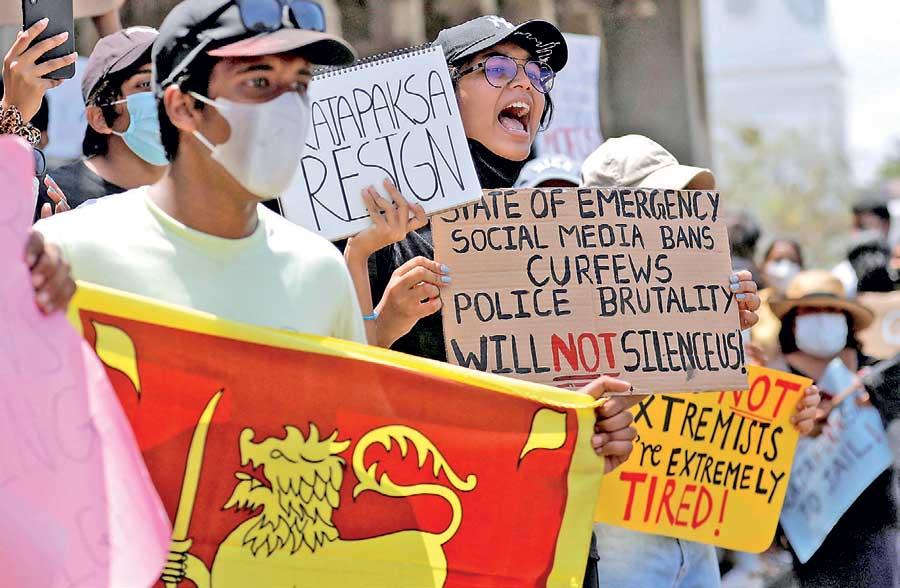
Thousands of protesters in Galle Face Green and in all major cities vowed not to give up their struggle until the president and the prime minister and the entire cabinet step down.
29 April 2022
In the face of an unprecedented massive economic and political crisis and a mounting public outcry demanding the ouster of President Gotabaya Rajapaksa and his government, Prime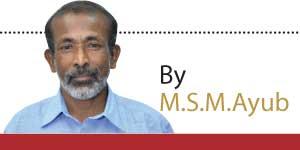 Minister Mahinda Rajapaksa has firmly stated that he would not step down. Neither his younger brother, the President seems to be prepared to heed to the countrywide agitations for his ouster.
Minister Mahinda Rajapaksa has firmly stated that he would not step down. Neither his younger brother, the President seems to be prepared to heed to the countrywide agitations for his ouster.
The Prime Minister, to justify his stance and that of his brother had stated that he does not need to heed to the call by the protesters as he came to power through a mandate by the people at elections. And he argues that in spite of a section of the people having come to the streets demanding the resignation of the President and his government, they did not represent the entire country or those who gave the mandate to the President and the government to rule the country.
From a traditional point of view and also in a way from a legal point of view, this seems to be a strong argument as there is no way to compare the numerical strength of those who demand the ouster of the government and those who still prefer this government to continue, until a nationwide election is held. Hence one can still contend that majority of people support the government and hence the mandate that was received by the President and the government is still intact.
"Besides, the Prime Minister should not reject the common sense within him when judging the situation on the ground. The country is politically in turmoil with agitations by thousands of people springing daily across the country calling for the ouster of the President and the government"
Yet, one can also argue on the same line to negate the Prime Minister’s position. On what grounds does he argue that the mandate that catapulted them to power is still intact? The vote base of the United National Party (UNP) had eroded by a massive 30% within three years from the Presidential election in 2015 to the local government elections in 2018, without any economic meltdown in the country like the one the country is faced with now. What is the assurance he has to rule out such an erosion of the vote bank of his party, the Sri Lanka Podujana Peramuna (SLPP) during the past two-and-a-half years since 2019 Presidential election?
Besides, the Prime Minister should not reject the common sense within him when judging the situation on the ground. The country is politically in turmoil with agitations by thousands of people springing daily across the country calling for the ouster of the President and the government. Thousands of youth have been agitating day and night in the Galle Face Green in front of the Presidential Secretariat since April 9, putting up tents and food stalls, maintaining a media centre and even opening a library. Interestingly, the protesters have named the protesting site “GotaGoGama.”
"The powerful Mahanayake Theras have also called on the President to form such an interim government"
Professionals of various sectors, artistes, writers, trade unions, university students and many other groups are making their contribution to that struggle by way of regular processions from various parts of Colombo to the Galle Face. Sri Lankans working in other countries on their part are conducting demonstrations in those countries demanding the resignation of the President and the government. People have surrounded houses of many ministers. No leader of the government is appearing in public.
Political parties including the main Opposition Samagi Jana Balawegaya (SJB) and the Janatha Vimukthi Peramuna (JVP) have been conducting separate demonstrations. The country was at a standstill on Thursday April 28, as workers of many sectors had struck work in support of the struggle to oust the President and the government. Except for those who participated in a few state-funded events nobody seems to come forward to defend the government or the President in public. Even a group of Parliamentarians from his own party, the SLPP have dared to demand the resignation of the Prime Minister. In the light of the “Maha Raja” public image Mahinda Rajapaksa had maintained a few years ago, this is unimaginable.
There was a time when the Rajapaksas openly rejected even the orders of the Supreme Court. Now the magistrate courts are rejecting the requests by the police to disperse the demonstrators even in front of the Prime Ministers official residence, the Temple Trees. The protesters placed wreaths in front of the Temple Trees while the police were looking on. What else does the Prime Minister need to realize that the public support from which the so-called mandate had emanated is no longer valid?
"Even a group of Parliamentarians from his own party, the SLPP have dared to demand the resignation of the Prime Minister. In the light of the “Maha Raja” public image Mahinda Rajapaksa had maintained a few years ago, this is unimaginable"
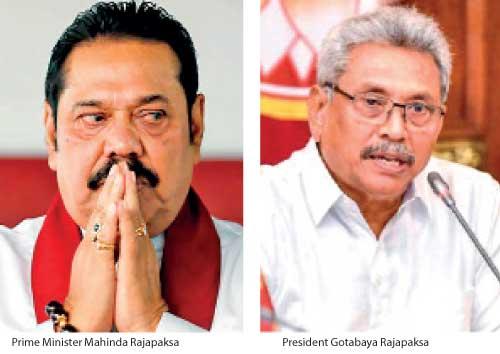 The people gave the mandate to the President and the SLPP through the Presidential and Parliamentary elections to rule the country resolving the problems faced by them. However, they have now chosen to form an all-party interim government in order to resolve the economic crisis the country is faced with. The powerful Mahanayake Theras have also called on the President to form such an interim government. This is a clear indication of acknowledgment by the President and the government that they are no longer capable of implementing the public mandate they received at the past elections on their own. Thus, attempting to cling on to power hiding behind the political term “mandate” is illegitimate, unethical and undemocratic.
The people gave the mandate to the President and the SLPP through the Presidential and Parliamentary elections to rule the country resolving the problems faced by them. However, they have now chosen to form an all-party interim government in order to resolve the economic crisis the country is faced with. The powerful Mahanayake Theras have also called on the President to form such an interim government. This is a clear indication of acknowledgment by the President and the government that they are no longer capable of implementing the public mandate they received at the past elections on their own. Thus, attempting to cling on to power hiding behind the political term “mandate” is illegitimate, unethical and undemocratic.
Mandate does not represent only the numerical strength of the people who voted for a President and a government. Neither is it an inalienable right; rather it is a responsibility which entails accountability to the actions of the President or the government, as the case may be. Also the mandate is not a free ride; it is conditional to the keeping of election promises and genuine efforts to resolve the issues faced by the people who gave the mandate to the politicians.
It is no longer valid in the event the government failed to solve the problems of the people, despite it having or not having taken genuine efforts to do so. In the case of the President Gotabaya Rajapaksa and the SLPP government, they have not only failed to solve the problems, but also created through their corrupt mindset an unprecedented massive economic crisis the resolution of which is seen even by the international experts to be extremely difficult.
The government subsequent to the 2019 Presidential election announced massive unsolicited tax cuts, depriving the public coffers of more than Rs.650 billion annually. It was clear that this measure was taken keeping the forthcoming Parliamentary election in mind. Now, the experts point out that it contributed hugely to the current economic crunch.
Despite these actions and the impacts of the COVID-19 on the country’s foreign reserves having created a massive pressure on the foreign debt problem, the government ignored the advices by many experts and Opposition parties to seek the assistance of the International Monetary Fund (IMF). The Newly appointed Central Bank Governor Dr. Nandalal Weerasinghe during a media briefing on April 9 had stated that he had pointed out the need for debt restructuring far back as September 2020, but it fell on deaf ears and country is now facing a crisis. Meanwhile the government’s decision to ban chemical fertilizer imports has destroyed the agriculture, leaving the farmers high and dry.
Although the government did a commendable job to contain the COVID 19 pandemic during its first wave in Sri Lanka, the health experts had to beg the leaders to take preventive measures thereafter as they were reluctant to do so. This also heavily impacted the economy. Finally, after playing havoc with the economy and thereby with the lives of the people, the Prime Minister or the President believing that they still enjoy the people’s mandate is ludicrous.
TUs threaten continuous strike unless President, govt. resign immediately
Yesterday’s strike launched by over 1,000 trade unions demanding the resignation of President Gotabaya Rajapaksa and the Cabinet of Ministers brought the country to a standstill.
Unionists also gathered in several locations in Colombo and marched to Gota Go Gama (GGG). They said President Rajapaksa and the Cabinet must resign within one week. If they did not comply, the warring unions would launch an indefinite strike from 06 May, they warned.
Ravi Kumudesh of the Collective of Trade Unions and Mass Organisations said that unions had sunk their differences and come together to demand the resignation of the President and the Cabinet.
“The government doesn’t command the confidence of public servants, private sector workers and others. It is obvious when you look at the crowds. The country has come to a standstill. Its time they went home,” he said.
Wasantha Samarasinghe, Executive Committee member of Jathika Jana Balawegaya said that the Rajapaksas must go home immediately before the people chased them away.
“They have bankrupted the country and now they are making the recovery difficult. President and the Cabinet must resign and let the people decide,” he said.
Meanwhile, only a handful of trains operated and fewer than 50% of private buses were seen on the road. “There weren’t many commuters,” Lanka Private Bus Operators Association (LPBOA) head Gemunu Wijerathne said.
Gamini Senevirathne, Deputy General manager of the Railway Department said that they were planning to operate the trains but on Wednesday night most railway unions had informed him that their members would not report for duty. “So, we couldn’t operate the trains,” he said.
Ceylon Teachers Union (CTU) General Secretary, Joseph Stalin said that most schools in the country had been closed as teachers and principals did not report for duty.
“All teachers and principals didn’t report for duty. We have shown that the government sector as well as the private sector is opposed to the government. If the government insists on staying, we will have to carry out a continuous strike,” he said.
State institutions across the country were closed. Over 5,000 workers of the Katunayaka Export Processing Zone too held a demonstration opposite the Evariwatte Road. Thousands of workers from the Watupitiwala Export Processing Zone marched to the Nittambuwa Junction in solidarity with the unions.
Estate sector workers too joined the strike.
With economic crisis many job losses in construction sector imminent
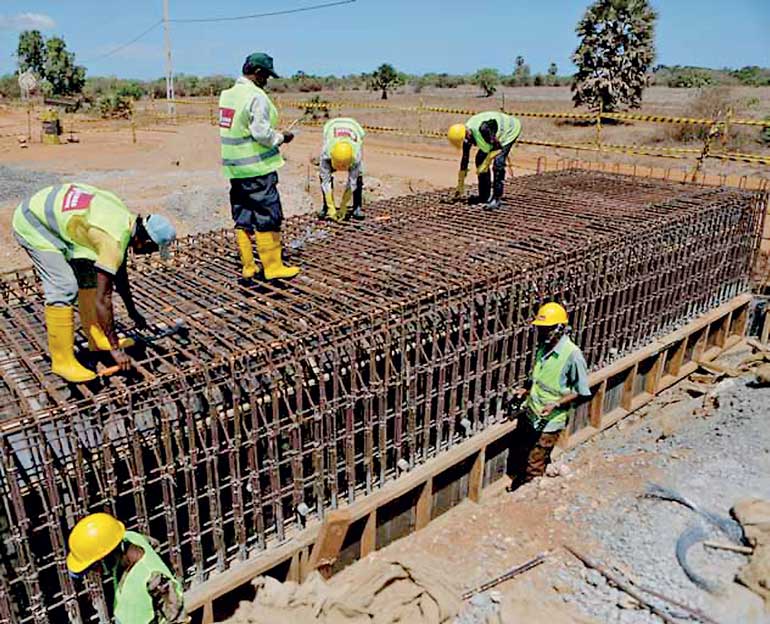
Tuesday, 26 April 2022
The Chamber of Industry of Sri Lanka (CCI), which is the apex representative body of all who are engaged in the construction sector, predicts that with the present economic crisis and due to several factors causing a debilitating impact, over 100,000 jobs will be lost within the next 3 months, unless immediate remedial action is taken. In the past, the construction industry used to contribute on average 8 -10% to the GDP. However, due to negative impacts in 2019 and 2020, the contribution to GDP was only 7.4% and 6.2% respectively. In addition, this sector has provided employment to 650,000 direct and 325,000 indirect. As such it must be reckoned as an integral growth sector that should be prioritised for economic revival, especially as the country is now in recession.
The main factors affecting can be summarised as below:
(I) Delays in payments for work done
(II) Unprecedented cost escalations
(III) Fluctuation of the exchange rate
(IV) Shortage of construction materials
(V) Difficulties in importing raw materials to manufacture construction materials
(VI) Suspension of capital expenditure works
(VII) Interest rate increases
(VIII) Recovery action by banks
At present the total overdue payments to construction contractors in the roads, buildings, and water supply sectors alone amount to nearly Rs.100 Billion. When other sectors are considered it will be more than this. To alleviate the burden on the industry, the Government is kindly requested to make early arrangements to settle these outstanding payments by the RDA, Education Ministry, UDA, and the NWSDB as a matter of urgency.
During the last 15 months, there has been an unprecedented increase in the prices of all construction materials. The table below gives the price changes of 5 basic materials.
With the free float of the Rupee, the exchange rate has now increased to Rs.340.00 against 1 US$. In Dec 2020 and Dec 2021 this was Rs.186.40 and Rs.203.00 respectively. Thus, an increase of 82.4%. As nearly 70% of the construction materials in building and other engineering constructions and 60% of road projects are import based, the impact of this will be to increase the construction costs by at least another 60%. In addition, the price of diesel which was Rs.121.00 / It in December 2021 is now Rs. 289.00 / lt, increased by 138.8% during the last 4 months. This increase will further increase the overall construction costs by another 5%.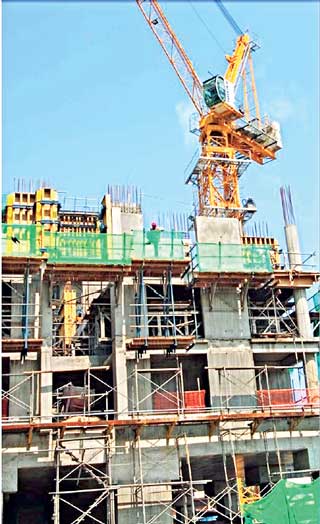
CCI acknowledged and appreciated the Cabinet Decision for the progressive solution of allowing the price escalation formula of the Construction Industry Development Authority (CIDA) to be applied up to an upper limit of 20% of the contract sum for contracts beyond 3 months that have excluded the price escalation clause. However, CCI regrets to note that certain state organisations are reluctant to offer this relief to its fullest extent to contractors. CCI therefore kindly requested the Ministry of Finance to communicate this Cabinet Decision to all SOE’s via a Public Finance Circular as the industry is in dire need of this relief. Due to the unprecedented cost increases shown above the 20% cap imposed earlier on price fluctuations will not be relevant any longer. Therefore, CCI strongly requests that this ceiling on price escalations should be removed and to allow the actual price escalation based on CIDA formula.
A common complaint is that CIDA price indices do not reflect the actual market price. Even though the CIDA is in the process of revising the price escalation formula and its responsiveness to the present market conditions, this exercise will take several months and once finalised will apply to work done in the future only. As an interim measure, the following reliefs are proposed.
(i) To immediately bridge the gap created by the formula, in not properly allowing for transport costs, to grant a 5% increase of the contract price as compensation for the sharp fuel price hike;
(ii) To provide for the difference of the Dollar fluctuation on the current CIF prices especially for Mechanical, Electrical and Plumbing (MEP) items, and any other items which are not reasonably covered by the CIDA price escalation formula.
In countries where statistics are available, it can be seen that quite often construction companies lead the bankruptcy numbers. This is due to the many variables in construction projects with differing site conditions, the large number of different materials needed, higher exposure to weather, operating on low profit margins (Usually 5%), inability to claim price increases fully, and the nomadic nature of the workforce. As a result, it is very important that timely payments for work done are received. It is seen that most construction companies become bankrupt not due to no – profitability but as a result of cash flow problems. In the present situation with unprecedented increases in material prices, exchange rates, and bank interest rates, the need to reimburse cost increases and timely payments must not be overemphasised. As such CCI wishes to introduce a “ Building and Construction Industry Security of Payment Act” similar to the Act in Singapore. This Act in Singapore has even provided the legal framework for adjudication and to enforce adjudication decisions. This will also address a lacuna prevailing at present in the adjudication process.
The Shortage of construction materials due to the import restrictions and difficulties in opening L/Cs because of the exchange crisis is having a serious impact on the completion of development projects. The importers of materials and also the manufacturers of building materials such as cement or steel etc are faced with the dilemma of correctly assessing the cost when importing raw materials on deferred L/C’s, as at the time of settlement of L/C’s the Rupee cost would have increased more than what was estimated. Very often by the time of settlement of L/C’s, the imported materials and the manufactured items would have been already fully sold due to a starved market and any extra cost due to the exchange rate fluctuation will have to be borne at a loss.
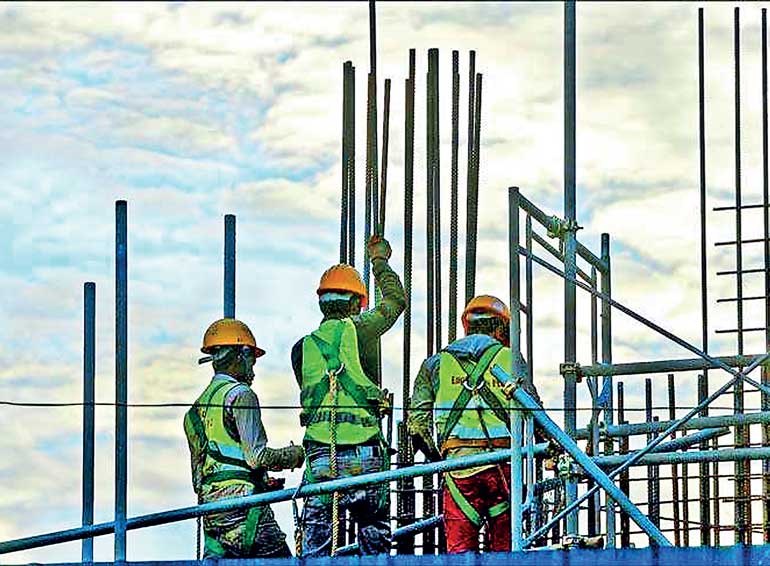
The new Secretary to the Ministry of Finance has indicated that the Government will be compelled to suspend capital works for at least 1 year. Perhaps the Government has no choice considering the huge budget deficit, and with the IMF applying brakes on money printing and the inability to release foreign exchange for construction sector imports; CCI wishes to propose that the foreign funded projects should proceed without any interruption. In fact, it will be prudent to have a mechanism to fast track these projects to improve the foreign exchange inflow from these. On the other hand, locally funded projects without a satisfactory EIRR could be suspended or stopped altogether. However, suspension of locally funded projects which are already commenced will have practical and legal issues. Government Authorities will have to negotiate and mutually agree on these on a reasonable basis.
For locally funded projects which are deemed important to continue the CCI wishes to propose establishing a credit line of about US$ 100 Million to cover the imports. To properly manage the disbursements on this credit line, CCI is willing to assist by setting up a mechanism to monitor the project requirements and make recommendations to the Ministry of Finance. Another suggestion is to allow property development companies to deposit sales proceeds in foreign currency in separate RFC accounts and utilise such funds to import items required for their property development projects. This measure will allow these projects to proceed smoothly.
It is observed that many projects are commenced at the whims and fancies of politicians and senior officials, without any regard to the EIRR. There are many examples of such projects that have led us to the present foreign exchange crisis. As such it is proposed that all future development projects shall commence only on the recommendation of a Technical Evaluation Committee appointed with the mandatory representation of CCI, which is established by an Act of Parliament.

The recently announced highest policy rate increases ever by the Central Bank will drastically increase the interest rates on all facilities such as bonds and guarantees, overdrafts, term loans, and leasing provided to businesses including construction companies. The Central Bank should ensure that banks will not increase rates on already approved facilities but only on new facilities. Also as the policy rate increase could be a short term measure, CCI wishes to propose that the interest rates on long term housing loans should not be increased.
The moratorium allowed by the Government and Central Bank on loans taken by the construction sector due to difficulties arising from a multitude of problems faced by the construction industry consequent to the COVID–19 pandemic and recession, ended on 31 March 2022. Due to large outstanding payments, unparalleled cost increases, import restrictions, and foreign exchange shocks the construction industry is still encountering the same difficulties. As such CCI wishes to request that the moratorium on loans taken by construction companies and property developers should be extended on the same basis up to 31 December 2022.
CCI wishes to inform that unless the Government takes serious note of the situation and takes necessary remedial action immediately, large scale retrenchment in the construction sector is unavoidable as the majority of construction sector employees are recruited on a project basis. If this happens the total job losses in the sector may exceed 100,000.
The writer is the Secretary General/CEO Chamber of Construction Industry.
Subscribe to:
Posts (Atom)


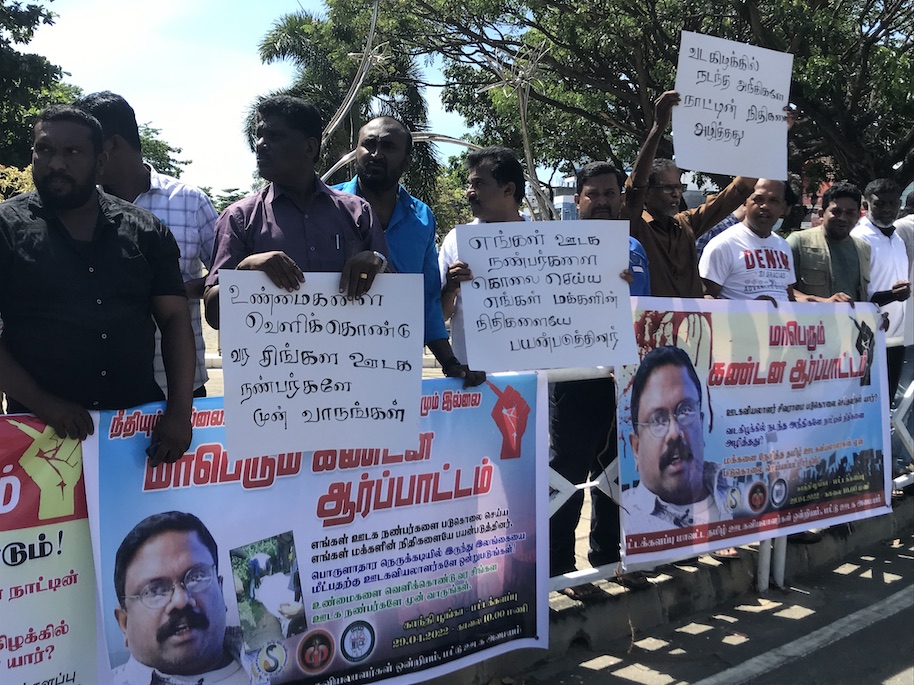
.JPG)
.JPG)
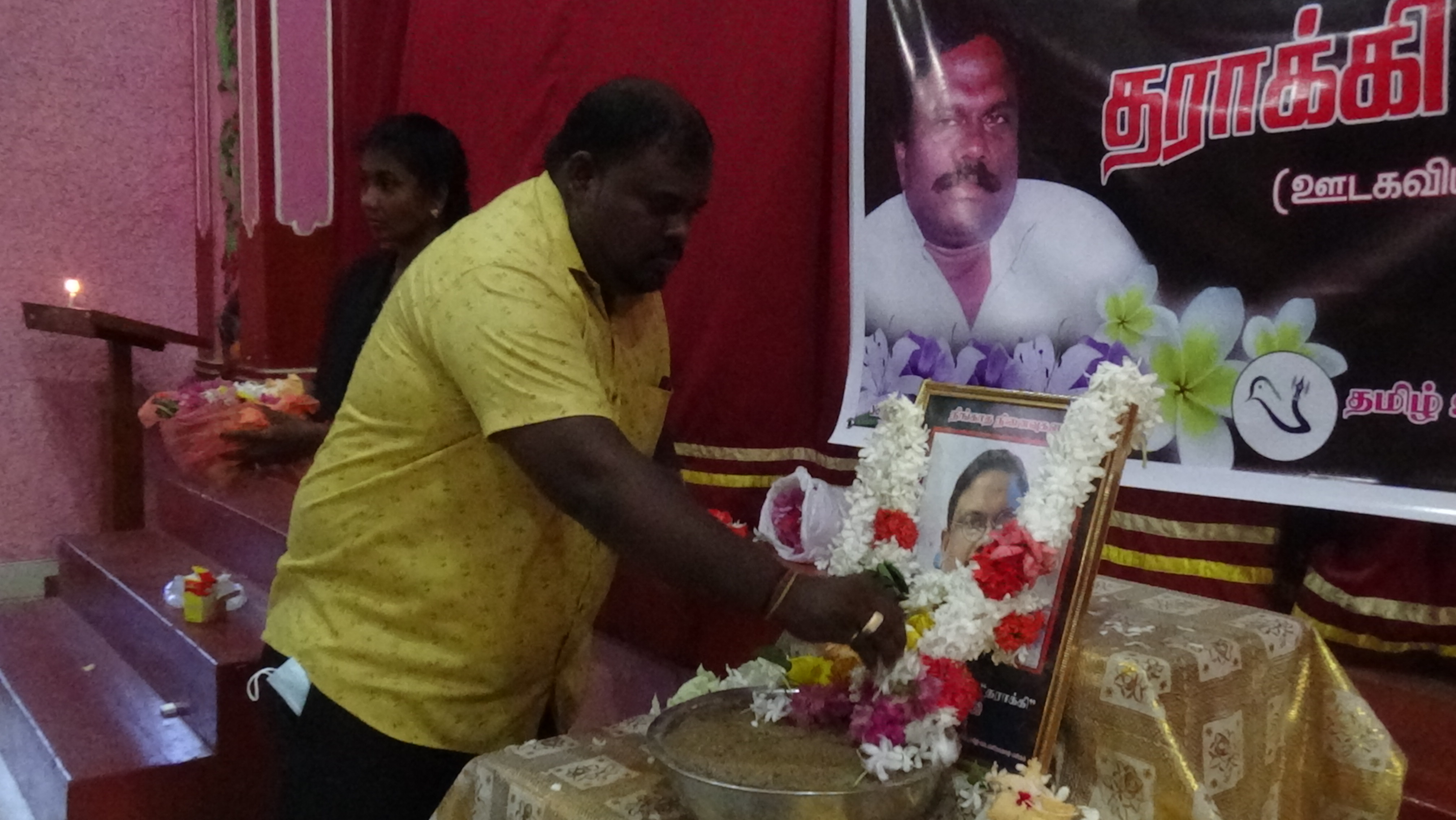

%20(1)%20(3)%20(1)%20(1).png)


%20(1)%20(1)%20(1).gif)


%20(2)%20(1)%20(2)%20(1)%20(1)%20(2)%20(1)%20(1)%20(1)%20(1)%20(1)%20(1)%20(1).png)
%20(1)%20(3)%20(1)%20(1).png)